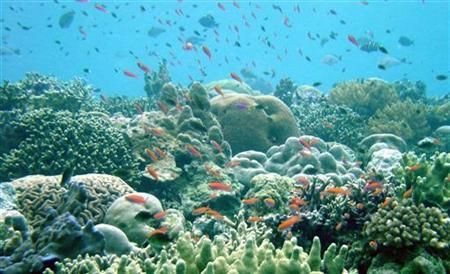Marine food chains are in danger of collapsing, Australian scientists warn

The food chains found in the world’s oceans are most likely to collapse, as a result of the expected acidification and warming of the seas, according to scientists at the University of Adelaide. After an extensive study analysing the global oceans, the researchers revealed that there is an imminent reduction in diversity and numbers of various key species that strengthen the marine ecosystem.
In a study that appeared in the journal Proceedings of the National Academy of Sciences, the simplification of oceans will have profound consequences for our current way of life, particularly for coastal populations and those that rely on oceans for food and trade.
The team of researchers led by marine ecologists Associate Professor Ivan Nagelkerken and Professor Sean Connell has conducted a meta-analysis of the data from more than 600 published experiments. They analysed studies covering tropical to artic waters, and a range of ecosystems from coral reefs, through kelp forests to open oceans.
“We know relatively little about how climate change will affect the marine environment. Until now, there has been almost total reliance on qualitative reviews and perspectives of potential global change. Where quantitative assessments exist, they typically focus on single stressors, single ecosystems or single species,” says Connell.
According to Connell, their analysis combines the results of all these experiments to study the combined effects of multiple stressors on whole communities, including species interactions and different measures of responses to climate change.
In the study, the researchers found that very few species will escape the negative effects of increasing carbon dioxide in the oceans. This will result to an expected large reduction in species diversity and abundance across the globe. However, microorganisms are expected to increase in number and diversity, they say.
Under ocean acidification, the primary production from the smallest plankton is expected to increase in the warmer waters, but this often does not translate into secondary production which shows decreased productivity.
Higher metabolic rates in the warmer water mean a greater demand for food, and there is a mismatch with less food available for carnivores. This means there will be a species collapse from the top of the food chain down, Nagelkerken says.
The analysis also showed that warmer waters and increased acidification will produce harmful impacts on habitat-forming species, such as coral, oysters and mussels. According to the researchers, any slight change in the health of habitats would have a broad impact on a wide range of species that these reefs harbour.
This week, the US National Oceanic and Atmospheric Administration published maps showing areas that are most vulnerable to ocean acidification. Their study identified that the Arctic and Antarctic oceans, and the upwelling ocean waters off the west coasts of North America, South America and Africa will be the regions most likely to suffer from greenhouse emissions released in the waters.
Contact the writer at feedback@ibtimes.com.au or tell us what you think below.





















